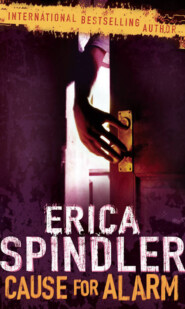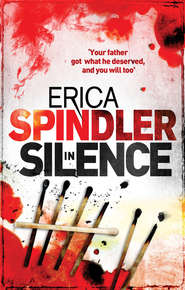По всем вопросам обращайтесь на: info@litportal.ru
(©) 2003-2024.
✖
Copycat
Автор
Год написания книги
2018
Настройки чтения
Размер шрифта
Высота строк
Поля
Kitt brought a hand to her head and massaged her aching temple. It was laughable, really. That first day, at the Entzel murder, she’d warned Riggio that “it wasn’t about her.”
But Riggio had maintained her cool objectivity; it was she who had lost it. She who had made it “about her.” How had she actually believed herself strong enough for this?
Her thoughts turned to the previous evening, the note she had found tacked to her door. She had bagged both the note and the tack, careful not to destroy any prints that might have been left on them. First thing, she had taken it to ID to have it dusted. Sergeant Campo, the ID supervisor, had arranged for one of the guys to go out and dust her door for prints. She didn’t think they’d find anything. “Peanut” was way too careful to make such a stupid mistake.
I’ll be in touch.
She shifted her gaze to her phone. But when would he call?
She realized her hands were trembling and dropped them to her lap. There’d been a time that telltale tremble would have sent her scrambling for a drink. Liquid calm. She had kept a flask in her glove compartment and another tucked into a boot in her locker.
No more. That was a part of her history she would never relive.
“Hungry?”
At the sound of her partner’s voice, Kitt looked up. M.C. stood in the doorway holding a brown paper sack. From the grease spots on it, she guessed the contents were from the deli across the street.
“Starving,” she said cautiously, half expecting M.C. to say “Good” and pull out a big sandwich to eat in front of her.
Instead, Riggio crossed to her desk, pulled up a chair and sat. “Figured you hadn’t stopped to eat, either.” She reached into the sack and pulled out two sandwiches. “Reuben or pastrami and swiss on rye?”
Kitt frowned slightly, feeling off balance by the younger woman’s thoughtfulness. “You choose,” she said.
Riggio passed her the pastrami and cheese. “I got chips, too. Mrs. Fisher’s, of course.”
Mrs. Fisher’s was a Rockford brand; their hearty, kettle-style chips a local favorite. When Kitt was growing up, her mom bought them from the factory in three-gallon tins.
They unwrapped the sandwiches—both topped with a big dill pickle spear—and began to eat.
“Canvas turn up anything?” M.C. asked around a bite of the greasy Reuben.
“Nada. Not even a dog barking.” Kitt washed the sandwich down with a sip of water. “This guy chooses a residential, out-of-the-way neighborhood. He leaves his car for hours on this quiet cul-de-sac, but nobody notices. Nobody hears a thing. Nobody needs to take a midnight leak, passes a window and sees the car. Who is this guy?”
She thumbed through her notes, looking for something she might have overlooked. She shook her head. There was nothing. “Poor little thing turned ten just a month ago.”
M.C. opened her bottle of water and took a drink. “Maybe he lives in the neighborhood.”
“Makes sense. He didn’t drive in, he walked.” She ripped open the chips. “Thanks, by the way. What do I owe you?”
“Nothing. You buy next time.”
Mary Catherine Riggio was full of surprises.
“Why are you being so nice?” she asked around a bite of sandwich.
“I’m no Mother Teresa, Lundgren. Fact is, you’re no good to me if you’re not thinking clearly. You need to take care of yourself.”
Or maybe not so full of surprises.
“Let’s run a background check on every Tullocks Woods resident sixteen and up.”
“Already begun.” Kitt popped a chip into her mouth and leaned back in her chair. “He doesn’t know all my secrets,” she murmured after a moment. “He’ll make mistakes. Move too fast. Screw up.”
M.C. took another swallow of water. “What are you talking about?”
“What the SAK said to me.” She met her partner’s eyes. “Both times he called, he described his crimes as ‘perfect.’”
M.C. wiped her mouth with a paper napkin. “Right. That’s why he’s pissed. Somebody’s ripped him off. And he doesn’t think this somebody is doing it right.”
“So, what makes the perfect crime?”
“Easy. Getting away with it.”
“And who gets away with it?”
“The smart ones. The ones who are careful. The ones who plan.”
“Exactly.” Kitt sat forward, feeling a stirring of excitement. “He told me, ‘This one will move fast, he won’t plan.’”
Kitt saw that M.C. was getting excited, too. “When you move fast, you’re sloppy. You miss things. You’re seen. You leave things behind at the scene.”
“The lack of evidence was one of the most frustrating things about the original SAK murders. He left us nothing to work with.”
“He knew what he was doing. He was highly organized.”
They fell silent. M.C. reached across and helped herself to one of Kitt’s chips. “So far, this one’s no different,” she said. “He’s left us nothing.”
“That we’ve uncovered yet,” Kitt corrected. “And he certainly has moved fast. Two girls in three days.”
M.C. munched on the chip, expression thoughtful. “What else made the original SAK murders un-solvable?”
“The randomness of the choice of original victims was a huge roadblock. We never found a link between them. Yeah, they were all blond, blue-eyed ten-year-olds, but all from different sides of town, backgrounds, schools, you name it.”
Usually a serial chose victims from a specific area, one he knew well and traveled often; or he chose them from a walk of life, such as prostitutes.
It was unusual for them to operate outside their comfort zone.
“So, how did he choose them?”
“Exactly.” Kitt held out the bag of chips for her partner. “And don’t forget, he stopped at three. With each victim, the odds of capture are raised. Hell, Bundy admitted to twenty-eight murders and may have actually committed more. The SAK didn’t give us that.”
“Why did he stop?” M.C. wondered aloud. “That’s another anomaly. Usually, they don’t.”
“He was busted,” Kitt offered. “Ended up doing time on an unrelated crime. Took him out of circulation.”
M.C. nodded. “It happens.”
“Presuming my caller is telling the truth about a copycat, maybe these two met in prison?”











